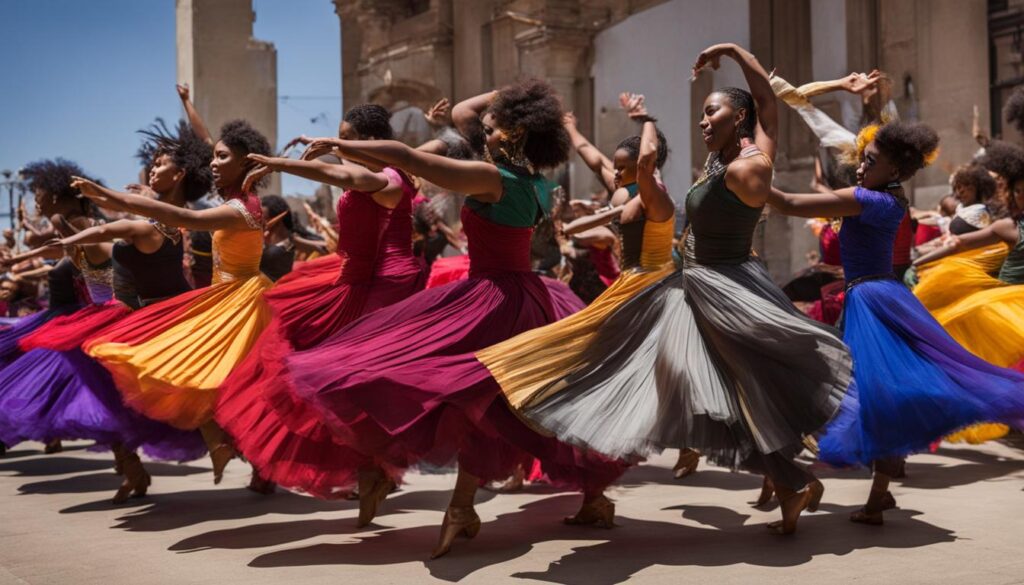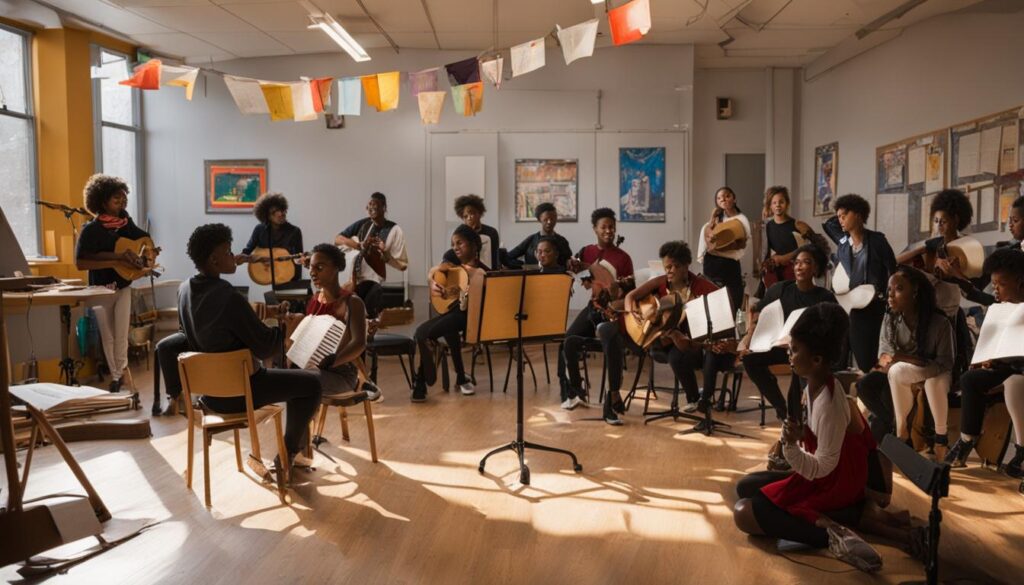Are you passionate about performing arts? Do you dream of a career that combines creativity and practical skills? A performing arts degree can open up a world of exciting opportunities for you! In this article, we will explore the various career options, job prospects, and benefits that come with a performing arts degree.
With a performing arts degree, you can pursue a range of careers in the performance industry. Whether you aspire to be an actor, dancer, choreographer, arts administrator, talent agent, or theatrical manager, the possibilities are endless. Additionally, many employers value the skills gained from a performing arts degree and are open to hiring graduates from diverse educational backgrounds.
Join me as we dive into the diverse pathways and abundant employment opportunities that await performing arts graduates. Let’s explore what you can do with a performing arts degree!
Key Takeaways:
- A performing arts degree offers a mix of creative talent and practical skills for various careers in the performance industry.
- Job options include actor, dancer, choreographer, arts administrator, talent agent, and theatrical manager.
- Many employers accept applications from graduates with any degree subject, expanding the range of possibilities.
- Performing arts graduates gain valuable transferable skills highly valued by employers.
- Further study and specialization opportunities are available for those who wish to explore different aspects of performing arts.
Jobs Directly Related to a Performing Arts Degree
For individuals who have pursued a performing arts degree, there are several exciting career paths that directly relate to their field of study. These careers not only allow them to utilize their skills and knowledge gained from their degree but also offer opportunities for personal growth and artistic expression.
One of the most popular career options for performing arts graduates is being an actor. Whether it’s performing on stage or in front of the camera, actors bring characters to life and captivate audiences with their talent. Another career option is becoming a dancer, where individuals can showcase their skills in various dance styles, from classical ballet to contemporary dance.
Music production is another field that offers numerous opportunities for performing arts graduates. They can work as music producers, collaborating with artists to create and record music that resonates with listeners. Additionally, careers in theatre offer graduates the chance to direct and produce plays, bringing stories to life and creating memorable experiences for audiences.
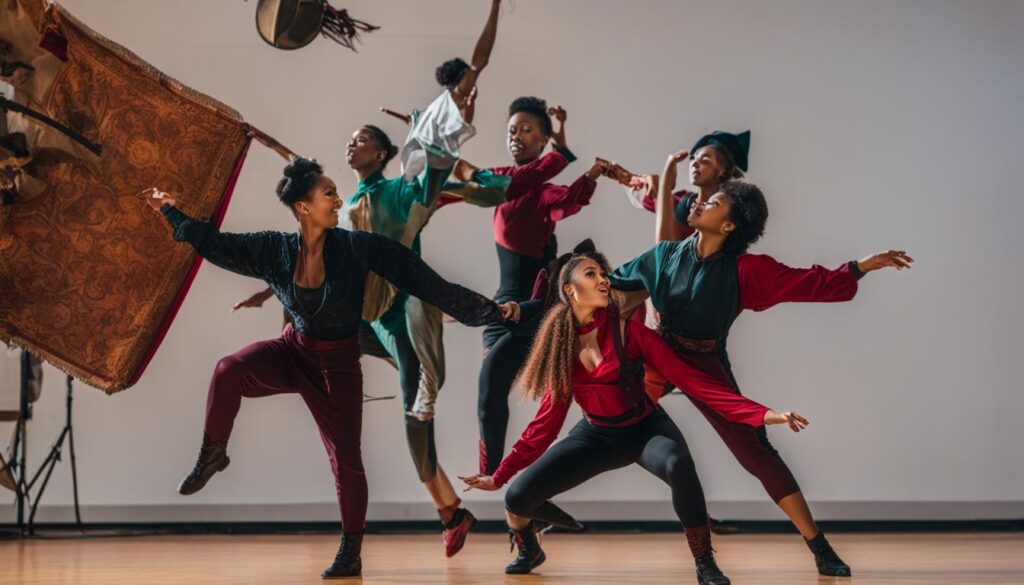

In summary, jobs directly related to a performing arts degree encompass a wide range of roles, including acting, dancing, music production, and theatre. These careers allow individuals to tap into their artistic talents, showcase their creativity, and contribute to the vibrant world of performing arts.
Jobs Where a Performing Arts Degree Would Be Useful
A performing arts degree offers a wide range of career opportunities beyond traditional performance roles. Here are some jobs where a performing arts degree can be highly useful:
1. Careers in Arts Administration
Arts administration involves managing the business and operational aspects of arts organizations, such as theaters, dance companies, or music festivals. With a performing arts degree, you can utilize your knowledge of the industry and artistic practices to oversee marketing, fundraising, event planning, and budget management.
Arts administrators work closely with artists, ensuring smooth operations and creating opportunities for them to thrive. They play a crucial role in connecting artists and audiences, making a significant impact on the cultural landscape.
2. Careers in Education
If you have a passion for teaching and sharing your love for the performing arts, a performing arts degree can open doors to careers in education. You can become a dance teacher, drama instructor, or music educator in schools, colleges, or private studios.
As an educator, you’ll inspire and guide aspiring performers, helping them develop their skills and knowledge. You may also have the opportunity to direct school performances and showcase the talents of your students.
3. Careers in Broadcasting
The broadcasting industry offers various roles where a performing arts degree would be useful. You can work as a television or radio presenter, using your performance skills to engage and captivate audiences.
Additionally, you can explore opportunities in production, scriptwriting, or directing for television or radio. With your understanding of storytelling and performance, you can contribute to the creation of compelling content for broadcasting platforms.
4. Careers in Special Effects
The world of special effects in film, television, and theater requires creative individuals with a deep understanding of performance and visual aesthetics. With a performing arts degree, you can pursue careers as a special effects technician or coordinator.
You’ll collaborate with directors, set designers, and production teams to bring imagination to life through visual effects, props, and costumes. Your knowledge of performance techniques and artistic sensibilities will enhance the overall production value.
5. Careers in Talent Management
Talent management is a critical aspect of the performing arts industry. As a talent manager, you’ll work closely with artists, helping them navigate their career paths and opportunities.
Your performing arts degree will equip you with the understanding of the industry and the skills to identify talent, negotiate contracts, and strategize career development. You’ll play a crucial role in shaping the careers of performers and connecting them with the right opportunities.
Table: Career Opportunities in Performing Arts
| Job Role | Description |
|---|---|
| Arts Administrator | Manage the business aspects of arts organizations |
| Education | Teach and inspire students in performing arts |
| Broadcasting | Present, produce, or direct content for television or radio |
| Special Effects | Create visual effects and enhance productions with technical expertise |
| Talent Management | Guide and support performers in their career development |
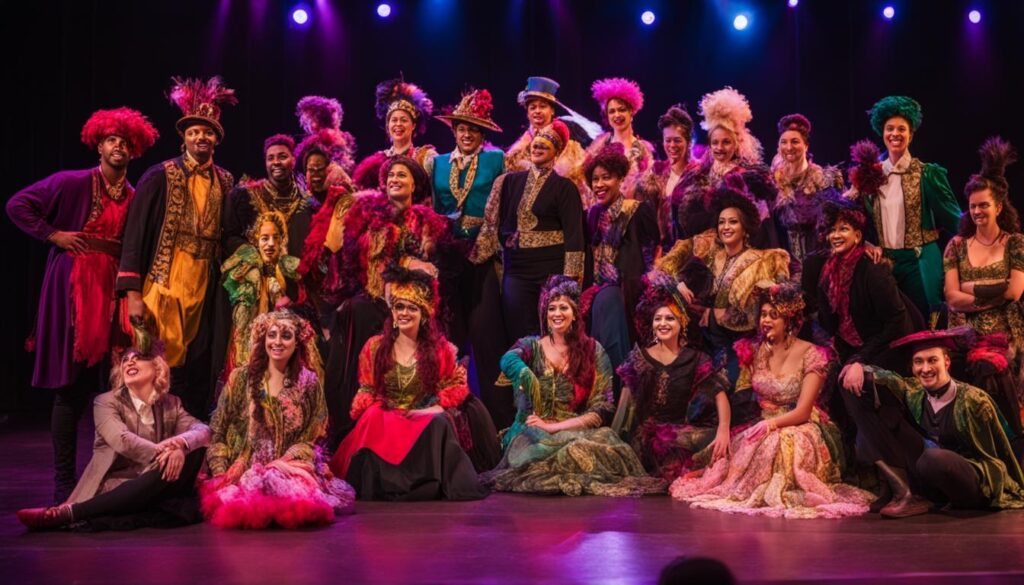

Performing arts degrees open up a world of possibilities beyond the spotlight. With the right skills and knowledge, you can find fulfilling careers in arts administration, education, broadcasting, special effects, and talent management. Whether you’re interested in behind-the-scenes work or using your performance background in a different context, a performing arts degree can provide a strong foundation for success.
Work Experience and Voluntary Projects in Performing Arts
As a performing artist, gaining work experience and participating in voluntary projects can be incredibly beneficial for your career development. These opportunities provide hands-on learning, networking possibilities, and a chance to showcase your skills and creativity. Whether it’s community projects, supporting industry professionals, or organizing workshops, engaging in work experience and voluntary projects can open doors to new opportunities and help you grow both personally and professionally.
Community projects in performing arts allow you to connect with local communities and make a positive impact through artistic expression. These projects often involve collaborating with other artists and community members to create performances, workshops, or events that bring people together and promote creativity.
Additionally, supporting industry professionals through work experience can give you valuable insights into the practical aspects of the performance industry. You may have the opportunity to assist with rehearsals, production coordination, or stage management, gaining firsthand knowledge of how shows and performances come together. This experience not only enhances your understanding of the industry but also allows you to build relationships with professionals who can serve as mentors or provide future opportunities.
Organizing workshops or creative laboratories is another way to broaden your horizons and showcase your talent. These opportunities allow you to share your knowledge and skills with others while also learning from their perspectives and experiences. By facilitating these sessions, you can develop your leadership and communication abilities, while also fostering a supportive and collaborative environment for fellow artists.
| Type of Project | Description |
|---|---|
| Community Projects | Collaborate with local communities to create performances or events that promote artistic expression and bring people together. |
| Supporting Industry Professionals | Assist professionals in rehearsals, production coordination, or stage management to gain firsthand knowledge of the industry and build connections. |
| Workshops and Creative Laboratories | Organize sessions to share your knowledge and skills with others while also learning from their perspectives and experiences. |
Overall, work experience and voluntary projects in performing arts offer invaluable opportunities for growth, skill development, and networking. They allow you to explore different aspects of the industry, contribute to the community, and expand your artistic horizons. By actively seeking out these experiences and embracing the challenges they bring, you can enhance your journey as a performing artist and pave the way for a successful and fulfilling career.
Typical Employers in Performing Arts
Performing arts graduates have a wide range of employment opportunities across various sectors. Here are some typical employers in the performing arts industry:
- Local Government: Local government organizations often provide funding and support for performing arts initiatives and events. They may employ performing artists to work in community outreach programs, cultural centers, or arts development departments.
- Arts Organizations: Non-profit and for-profit arts organizations, such as theaters, dance companies, and music ensembles, offer employment opportunities for performing arts graduates. These organizations hire performers, directors, choreographers, and production staff.
- Education Institutions: Schools, colleges, and universities employ performing arts graduates as teachers, instructors, and coaches. Performing arts graduates can share their skills and expertise with students of all ages and inspire the next generation of performers.
- National Health Service (NHS): The NHS recognizes the therapeutic benefits of performing arts and employs performing artists in various healthcare settings. They may work as art therapists, using performing arts to facilitate healing and well-being.
- Leisure Companies: Leisure companies, such as theme parks, cruise lines, and entertainment venues, often hire performing arts graduates as performers, entertainers, or event organizers. These companies value the creativity and talent of performing arts professionals.
- Voluntary Organizations: Voluntary organizations, including community arts projects and cultural charities, provide opportunities for performing arts graduates to engage with diverse communities and contribute to social causes through their artistic skills.
It’s important to note that many performing artists also work on short-term or freelance contracts, moving between different employers and projects. They often generate opportunities through networking, auditions, and collaborations. This flexibility allows them to explore different avenues and gain diverse experiences in the performing arts industry.
Take a look at the table below for a visual representation of typical employers in the performing arts industry:
| Employer | Description |
|---|---|
| Local Government | Provides funding and support for performing arts initiatives and events |
| Arts Organizations | Non-profit and for-profit organizations that hire performers, directors, and production staff |
| Education Institutions | Schools, colleges, and universities that employ performing arts graduates as teachers and instructors |
| National Health Service (NHS) | Employs performing artists in healthcare settings to facilitate healing and well-being |
| Leisure Companies | Theme parks, cruise lines, and entertainment venues that hire performers and entertainers |
| Voluntary Organizations | Community arts projects and cultural charities that engage with diverse communities |
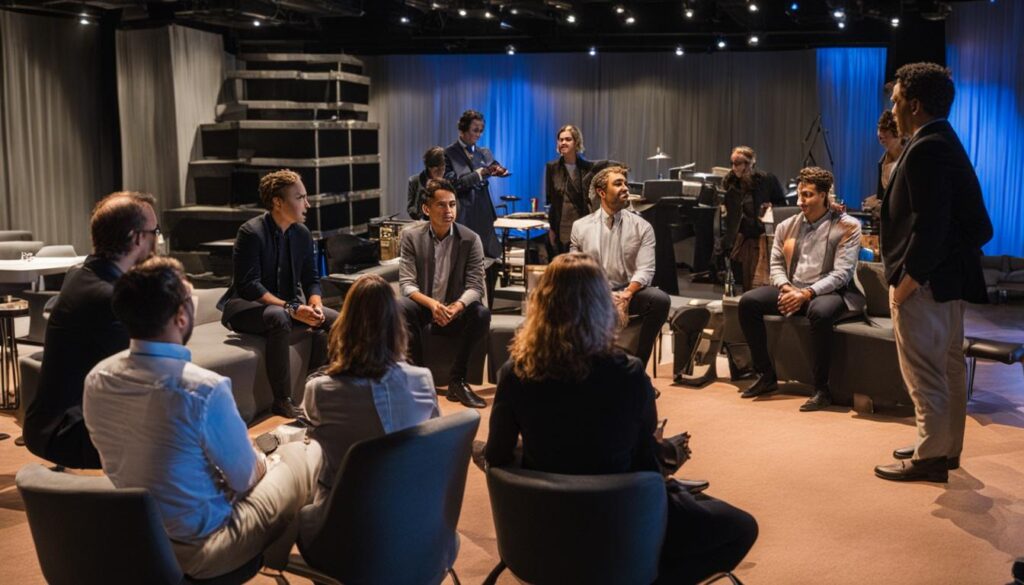

“Working with different types of employers allows performing arts professionals to diversify their skills, expand their network, and discover new opportunities within the industry.” – Performing Arts Career Expert
Skills Gained from a Performing Arts Degree
Studying performing arts equips individuals with a range of valuable skills that are highly valued by employers. These skills include:
- Confidence: Through rigorous training and performance opportunities, performing arts students develop confidence in their abilities, enabling them to present themselves effectively in professional settings.
- Teamwork and Collaboration: The performing arts often require individuals to work closely with others, fostering a strong sense of teamwork and collaboration. This skill is transferable to many industries and is highly valued by employers who seek candidates who can effectively work in a team.
- Time Management: Balancing rehearsals, performances, and academic coursework in a performing arts degree requires strong time management skills. Graduates with these skills are well-equipped to handle tight deadlines and manage their time effectively in any professional setting.
- Communication Skills: Performing arts students develop excellent communication skills through various forms of expression, including acting, dancing, and music. These skills are essential for effective collaboration, presentation, and interaction with colleagues and clients.
- Critical Thinking: The performing arts encourage students to think critically and analyze different perspectives, enhancing their ability to problem-solve and make informed decisions in a creative and dynamic environment.
- Self-Discipline: Performing arts degrees require dedication, practice, and self-discipline. Graduates possess the ability to stay motivated, set goals, and work independently, which are highly valued traits in any professional setting.
These transferable skills make performing arts graduates adaptable and well-prepared for various career paths. Whether pursuing a career in the performing arts industry or branching out into other sectors, the skills gained from a performing arts degree provide a solid foundation for success.
“Studying performing arts not only teaches you how to perform on stage but also instills important life skills such as creativity, teamwork, and effective communication. These skills are highly valued in the job market, making performing arts graduates versatile and sought after by employers.” – Jane Smith, Performing Arts Graduate


Career Opportunities
The skills gained from a performing arts degree open up a range of career opportunities across different industries. Some potential career paths include:
| Industry | Example Job Roles |
|---|---|
| Performing Arts | Actor, Dancer, Musician, Choreographer |
| Arts Administration | Arts Administrator, Event Coordinator, Fundraiser |
| Education | Teacher, Lecturer, Teaching Artist |
| Media and Entertainment | Broadcast Presenter, Film Director, Talent Agent |
| Corporate Communication and Events | Public Relations Specialist, Event Planner |
These are just a few examples, and the skills gained from a performing arts degree can be applied in various ways depending on the individual’s interests and career goals.
Further Study and Specialization in Performing Arts
If you’re looking to deepen your knowledge and expertise in the performing arts field, there are various options for further study and specialization. These opportunities can help you enhance your skills, expand your career prospects, and explore specific areas of interest within the performing arts industry.
One avenue for further study is vocational courses in performing arts. These courses provide practical training and specialized knowledge in areas such as arts administration, stage management, or technical production. By enrolling in a vocational course, you can acquire valuable practical skills that will make you more competitive in the job market and open up new career opportunities.
Another option is to pursue postgraduate courses in performing arts. These programs offer in-depth study and research opportunities, allowing you to delve deeper into a specific aspect of the performing arts, such as acting techniques, dance choreography, or musical composition. Postgraduate study can also provide a platform for networking with industry professionals and establishing yourself as an expert in your chosen field.
Whether you opt for vocational courses or postgraduate study, further specialization in performing arts can give you a competitive edge and set you apart in the industry. It allows you to develop a unique skill set and knowledge base that can be applied in a variety of professional contexts. By honing your expertise, you can position yourself as a sought-after professional in the performing arts field.


Vocational Courses in Performing Arts
| Course | Description |
|---|---|
| Arts Administration | Learn the management and administrative skills required to run arts organizations, theaters, or cultural events. |
| Stage Management | Gain practical knowledge of stage production and learn how to manage the technical aspects of a performance. |
| Technical Production | Develop skills in lighting, sound, and set design to work behind the scenes in theater, film, or live events. |
Postgraduate Courses in Performing Arts
| Course | Description |
|---|---|
| Acting Techniques | Deepen your understanding of acting methodologies and explore advanced performance techniques. |
| Dance Choreography | Focus on the art of dance composition and learn how to create original choreography for various dance forms. |
| Musical Composition | Refine your skills in music composition and explore different genres and styles of musical expression. |
Conclusion
So, what can you do with a performing arts degree? The answer is, quite a lot! The performing arts industry offers a wide range of career opportunities for graduates, from traditional paths like acting, dancing, and music production to roles in arts administration, education, and broadcasting.
One of the key benefits of a performing arts degree is the development of valuable skills that are highly sought after by employers. Through their studies, performing arts graduates gain confidence, teamwork and collaboration abilities, time management skills, effective communication, critical thinking, and self-discipline. These transferable skills make them well-prepared for various career paths, not just within the performing arts sector.
If you’re looking for job opportunities in performing arts, you’ll find a diverse range of employers to choose from. Local government, arts organizations, education institutions, the National Health Service (NHS), leisure companies, and voluntary organizations all offer employment prospects. It’s worth noting that many performers also work on short-term or freelance contracts, moving between different fields and generating opportunities through networking, auditions, and collaborations.
For those who want to specialize further or explore different aspects of their craft, further study in performing arts is an option. Vocational courses in arts administration or teaching certification can help expand career possibilities. Additionally, postgraduate courses provide opportunities for research and in-depth exploration of specific areas of interest.
FAQ
What can you do with a performing arts degree?
A performing arts degree can lead to various careers in the performance industry, such as actor, dancer, choreographer, arts administrator, talent agent, and theatrical manager. Graduates can also find employment in fields like education, broadcasting, special effects, and arts administration.
What are some jobs directly related to a performing arts degree?
Some of the jobs directly related to a performing arts degree include actor, community arts worker, choreographer, dancer, dramatherapist, music producer, and theatre director. These roles involve utilizing the skills and knowledge gained from a performing arts degree to pursue careers in acting, dancing, music production, and theater direction.
What are some jobs where a performing arts degree would be useful?
Some careers where a performing arts degree would be useful include arts administrator, broadcast presenter, film director, higher education lecturer, secondary school teacher, special effects technician, and talent agent. A performing arts degree provides transferable skills that can be applied in various industries beyond the performing arts sector.
How can work experience and voluntary projects benefit performing arts graduates?
Engaging in work experience and voluntary projects in performing arts can provide valuable opportunities for growth, networking, and skill development. This can involve participating in community projects, supporting industry professionals, and organizing workshops or creative laboratories.
Who are some typical employers in the performing arts industry?
Performing arts graduates can find employment opportunities with various types of employers, including local government, arts organizations, education institutions, the National Health Service (NHS), leisure companies, and voluntary organizations. Many performers also work on short-term or freelance contracts, generating opportunities through networking, auditions, and collaborations.
What skills can be gained from a performing arts degree?
Studying performing arts equips individuals with a range of valuable skills, including confidence, teamwork and collaboration, time management, communication skills, critical thinking, self-discipline, and the ability to cope with criticism. These transferable skills make performing arts graduates adaptable and well-prepared for various career paths.
Can performing arts graduates pursue further study and specialization?
Yes, performing arts graduates who wish to specialize further or explore different aspects of their subject can pursue further study. This can include enrolling in vocational courses such as arts administration or obtaining a teaching certificate. Postgraduate courses in performing arts provide opportunities for research and in-depth exploration of specific areas of interest.
